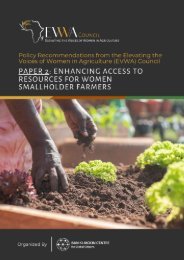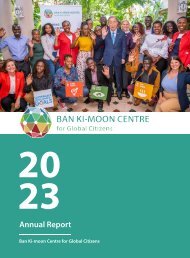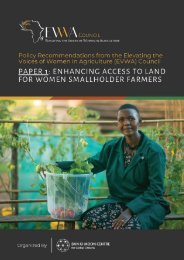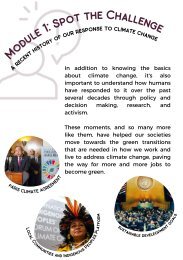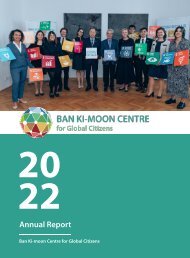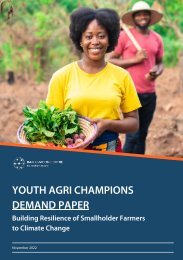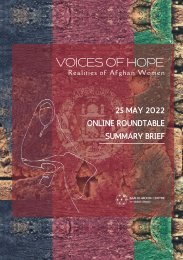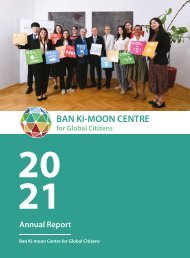Youth Agri Champions Demand Paper 2023
Over the summer of 2023, 17 young farmers, agripreneurs and representatives worked together to create a collaborative demand paper addressing the main 3 challenges they believe farmers face to have sustainable and profitable businesses. This paper details these demands.
Over the summer of 2023, 17 young farmers, agripreneurs and representatives worked together to create a collaborative demand paper addressing the main 3 challenges they believe farmers face to have sustainable and profitable businesses. This paper details these demands.
Create successful ePaper yourself
Turn your PDF publications into a flip-book with our unique Google optimized e-Paper software.
The Challenge:<br />
Extension services are not as effective<br />
as they could be<br />
The <strong>Demand</strong>:<br />
Invest in extension services<br />
We ask the international community to support the<br />
Many extension services suffer from inadequate<br />
funding and insufficient staffing, leading to<br />
establishment of farmer field schools to provide<br />
training on practices and the use of technologies<br />
overburdened extension workers who lack the<br />
necessary travel budget to reach all smallholders,<br />
that enhance smallholders’ resilience to climate<br />
change. This requires the training of star farmers<br />
particularly those residing in remote regions. In this<br />
and the establishment of their farms as local centers<br />
case, they are often forced to spend their own<br />
money to prevent the most remote communities<br />
of excellence, where other farmers can receive<br />
training. This methodology has proven highly<br />
from going unserved. Furthermore, farmers are not<br />
always able to make the most of the training<br />
successful because it circumvents language barriers<br />
and allows farmers to see climate-smart practices<br />
opportunities extension services provide.<br />
and technologies in action, and witness their<br />
Not all farmers can afford to leave their fields for a<br />
impacts on yields first-hand. The farmer field<br />
schools should be designed to involve young<br />
day or travel without being compensated. When<br />
they do attend and learn useful new techniques,<br />
farmers, who tend to have the technical knowledge<br />
and forward-looking mindset required to advance<br />
farmers often lack the means to implement them,<br />
due to lack of access to credit or the technologies<br />
climate-smart agriculture.<br />
required. Finally, in many countries, the capacity<br />
building landscape (which includes extension<br />
In addition, we ask governments to develop<br />
consistent national strategies and messaging on<br />
services and trainings organized by other actors) is<br />
fragmented. As a result, farmers receive piecemeal<br />
issues such as monocropping and excessive<br />
training rather than a comprehensive curriculum<br />
and may be overburdened by too many trainings<br />
fertilizer use. Both are inconsistent with climatesmart<br />
agriculture principles but continue to be<br />
promoted by other organizations, undermining the<br />
held as part of different programs.<br />
effectiveness of our capacity building efforts. Based<br />
on the latest evidence, governments should<br />
develop regulations to ensure consistent messaging<br />
across organizations.<br />
BKMC staff meet the <strong>Agri</strong><strong>Champions</strong> from Kenya during a field visit<br />
on one of their farms in September <strong>2023</strong><br />
<strong>Youth</strong> <strong>Agri</strong><strong>Champions</strong> <strong>Demand</strong> <strong>Paper</strong> 3




